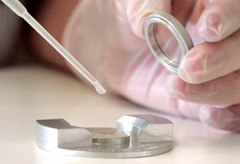Lab grown sperm provides fertility hope
Sperm has been successfully grown in a laboratory, providing infertile men with new hope of becoming biological fathers

Sperm has been successfully grown in a laboratory, providing infertile men with new hope of becoming biological fathers
Scientists from Japan have successfully managed to create lab grown sperm using fragments of testes bathed in nutrients.
The research team described sperm production as one of the most complex processes in the human body, taking a month from start to finish.
Dr Allan Pacey, a senior lecturer in andrology at the University of Sheffield, says the developments will lead to a better understanding of infertility, but maintained: ‘It is important to be cautious because sometimes species-specific differences in biology means that what works for one species does not work for another.’
The team from Yokohama City Universityused fragments of mouse testesto developed sperm, which they then used to fertilise eggs from which healthy, fertile young were born.
‘I want to apply our method to other species including humans,’ says Dr Takehiko Ogawa. ‘The sperm produced in our system should be safe.’
Dr Pacey said the success in mice was no guarantee that it could be matched in humans, but agreed: ‘This study is a small but important step in understanding how sperm are formed which may, in time, lead to us being able to routinely grow human sperm in the laboratory.’
Marie Claire Newsletter
Celebrity news, beauty, fashion advice, and fascinating features, delivered straight to your inbox!
Marco Seandel and Shahin Rafii from Weill Cornell Medical College in New York said that the approach represents a crucial experimental advance along the thorny path to the clinical use of sperm developed in the laboratory.’
-
 The 10 best dresses celebrities from Tiffany & Co.'s Blue Book 2025 Gala
The 10 best dresses celebrities from Tiffany & Co.'s Blue Book 2025 GalaCelebrating the brand's marine-inspired collection
By Sofia Piza
-
 These are the 11 cult designer buys of spring 2025—and they're already selling out
These are the 11 cult designer buys of spring 2025—and they're already selling outFrom Miu Miu's must-have cowboy hat to Loewe's latest bag
By Clementina Jackson
-
 Prince William and Princess Kate have announced their 14th wedding anniversary plans
Prince William and Princess Kate have announced their 14th wedding anniversary plansBy Jenny Proudfoot